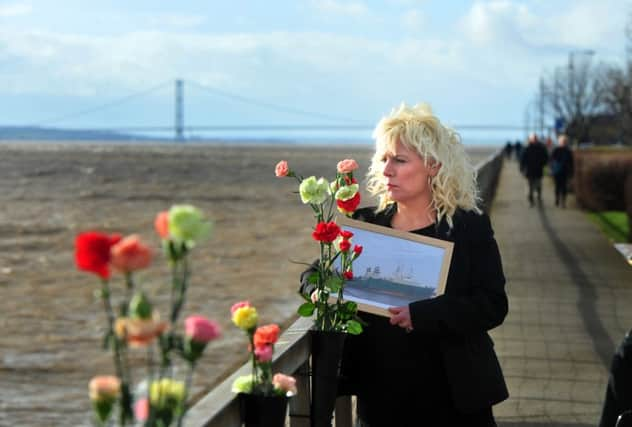40 years on, Hull grieves for the Gaul


The bell of the Gaul, recovered from 800ft down on the bottom of the Barents Sea, struck a poignant note yesterday to mark the 40th anniversary of the sinking of the supertrawler from Hull, around which myth, rumour and speculation has swirled for four decades.
“For the sake of the thousands lost at sea, we must continue to tell their story,” Rev Tony Cotson told the 500-strong congregation gathered in a marquee that creaked and groaned in the wind coming off the Humber.
Advertisement
Hide AdAdvertisement
Hide AdYesterday’s Lost Trawlerman’s Day was a reminder of the still raw sense of loss felt by family members, whose wounds were re-opened by the news before Christmas that remains found many years ago on a remote Russian peninsula may be those of their loved ones.
Jennifer Griffin’s 23-year-old brother John Heywood was a stowaway on the Gaul. He had a drink the night before with one of the crew and when he woke up she was out at sea. But his sister claimed he was quite happy to be on board as he owed money from a previous voyage.
“He always wanted to go on the Gaul,” she said. “It was a new ship only 18 months old. I hadn’t seen him for many moons before it happened. I’d love to see him now, he was the only one I had.”
She added: “If any of the remains are his I can put him with my mum.”
Advertisement
Hide AdAdvertisement
Hide AdAndy Atkinson was 10 when he lost his father Raymond, a deckhand on the Gaul, “a nice fellow, my hero, a bit of a character,” who was also a bit of a ladies’ man.
“He liked the ladies, but what fisherman doesn’t? He was a proper Hessle Roader,” said Mr Atkinson, who remembers his father taking him to the swimming baths.
Like many of the relatives, he is frustrated over the slow pace of the investigations being carried out by the Russian authorities on remains found by natives on the Rybachy peninsula in the Murmansk region of Russia in 1974 or 1975 and which were then apparently hidden for years buried under rocks.
Mr Atkinson, one of two wreath layers at yesterday’s service, along with Julie Naulls, who also lost her father, said: “It was a massive loss – I still get emotional today.
Advertisement
Hide AdAdvertisement
Hide Ad“When they found bones originally (remains have been found previously) they had the results of that within weeks. Why can’t our Government demand that the Russian Government send us a sample of the bones so they can quickly test them and see whether they are British or from the Gaul?”
Miss Naulls, who was only three when her father Colin was lost, has one memory – “getting chowed at for breaking my sister’s Walkman”. Her brother Kenny was a year older. When he grew up, he went fishing for a year before his mother put a stop to it.
Now an operations manager for a fishing company, like others he finds more questions than answers in the recent discovery, and said: “They found the bodies in the 70s, so why didn’t they ask questions then?”
Ken Collier who lost his father Stan, the assistant factory manager on the Gaul, says he is one of the few lucky ones to have a grave to visit. His father’s remains were laid to rest after being recovered from the seabed in a dive in 2002.
Advertisement
Hide AdAdvertisement
Hide AdHe said: “I hope and pray they are off the Gaul, but in my heart of hearts I don’t think they are. I’ll only know the truth when I go to meet my Dad, I will only get the answers then.”
New chapters keep getting added to the story of the Gaul. Her disappearance without sending a Mayday at the height of the Cold War in a sensitive military area fuelled suspicions that she had been used to spy on the Russians.
Eventually she was found resting near a thick steel cable, which a documentary later claimed linked her to a US anti-submarine project monitoring the passage of Russian submarines.
The discovery of remains in 2002 led to a second public inquiry two years later, which led to official confirmation trawlers were used for espionage – but found no evidence the Gaul was one of them.